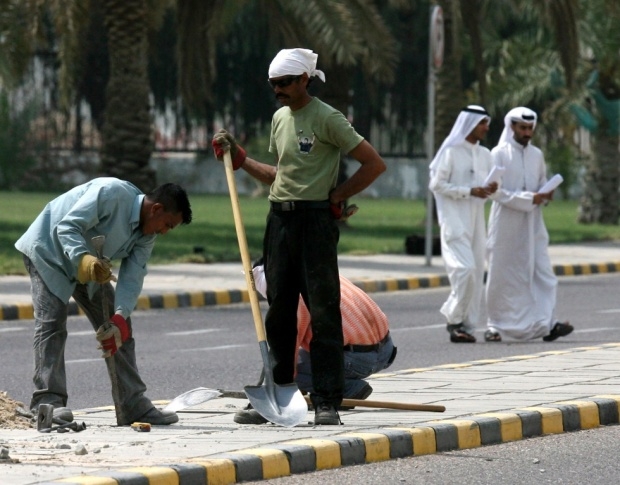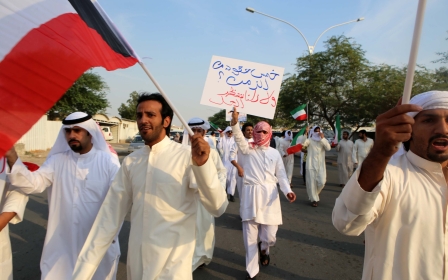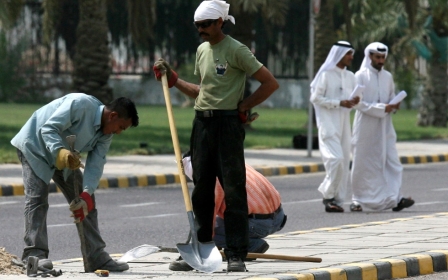Deported for BBQ-ing? Kuwaiti ex-pats feel the heat

Even before its riches of buried black gold were commercially pumped to the surface, Kuwait has attracted expatriates in search of new opportunities. As the country's wealth multiplied, so too did it's foreign population, surging from thousands to millions leading to a monumental shift in its demographics.
Kuwait's first official census was conducted in 1957, four years before gaining independence from the British mandate. Citizens in the early-oil state made up over 206,000 of the population of around 300,000.
At the time, foreign residents were merchants, fishermen, boat builders and pearl hunters who were attracted to the port city intersecting global trade routes. Their industries, however, soon faded as the more lucrative industry began to dominate the economy.
The most recent census, published mid 2014, highlights the change. The population has now exceeded 4 million people of whom only 1.26 million are Kuwaitis.
"Kuwait is suffocating under the presence of nearly 3 million foreigners, a significant majority of whom are marginal, unskilled workers," MP Abulla al-Tameemi told Middle East Eye.
The ballooning non-Kuwaiti community and its implications on the society have stirred countless debates, with many nationals blaming expats for depleting the country's resources, exhausting its insufficient services, and driving its crime rates upwards.
Dependence on expatriates
The small state relies heavily on foreign labour. The government's Central Statistical Bureau puts the size of Kuwaiti employees in the public sector at around 73 percent of its total workforce, attracted by the sector's generous perks.
As for the private sector, expatriates occupy over 95 percent of its jobs. Albeit bonuses offered by the state to encourage Kuwaitis to join the private sector, nationals avoid its longer working hours, more strenuous tasks and lower pay.
This is in addition to largely-Asian domestic workers who were estimated to be around 660,000 by the rights group, Human Rights Watch in 2010.
"It's inevitable that we can't do without foreign workers, but something needs to be done," al-Tameemi said.
It is with that in mind that al-Tameemi submitted a draft bill to limit an expatriate's stay in the country to a non-renewable five-year period, and cap the size of any foreign community to 10 percent of the Kuwaiti population.
The proposal, if approved, would mean culling the Indian community of over 700,000, the Egyptian one of over 500,000, the 200,000 Bangladishis, the 160,000 or so Filipinos and over 140,000 Syrians, reducing each community to 124,000 people.
Al-Tameemi's proposal also bars expatriates from bringing their families to Kuwait.
"A significant portion of these thousands have no jobs. Many were duped by visa traders into paying fortunes to come to Kuwait, only to find upon arrival that no job awaits them," al-Tameemi said.
He explained that "the marginal, unskilled workforce" remaining in Kuwait have become a burden on health services, and jam traffic.
Deportations, fines and fees
In order to pass, Al-Tameemi's draft bill needs to pass parliamentary panels, win a majority at the assembly and get the government's approval. Many think the law won't get that far.
He, however, thinks he has enough backing. "Many lawmakers see an urgency in dealing with this problem, and so does the government," al-Tameemi said. "Ministers have actually put their weight behind my proposal and are either considering it or looking into similar options."
While consecutive governments have made repeated empty promises of tackling the inflating number of expatriates, recent years have seen a surge in action.
Regular raids by the Ministry of Interior have seen thousands of mainly low-paid, "illegal" Asian workers being reportedly deported. A more aggressive crackdown campaign is vowed by officials, driving thousands more into hiding.
The government has also toughened traffic penalties, vowing to deport foreigners committing recurring, grave violations. Expatriates caught barbecuing in non-allocated areas have also been kicked out.
However, following increased criticism over measures seemingly targeting only non-Kuwaitis, policemen were stripped of the authority to expel expatriates, mandating an approval be issued by the ministry first.
Kuwait follows the steps of other Gulf neighbours. In Saudi Arabia, illegal foreign workers have been deported in the thousands, and Oman has adopted similar measures along with imposing laws to regulate expatriates' lives.
Administrative requirements for foreigners in Kuwait are also worsening.
Assistant Undersecretary for Citizenships and Passport Affairs, Major General Sheikh Mazen al-Jarrah, told Al-Qabas newspaper that about 5 million Kuwaiti dinars ($11.2m) were collected in fines from thousands of expatriates since late last year. The state decided then to revive a legal article forgotten from the 1950s, tying the validity of a residence document to the expiry of the holder's passport.
Local media has also reported that medical fees paid by expatriates are to increase by 15 percent. The government is also looking into barring foreigners from receiving medical care during the day at public hospitals, to make way for disgruntled citizens.
'We are not against expatriates'
In March of last year, the then-Minister of Social Affairs and Labour, Thekra al-Rashaidi announced a plan to deport 100,000 expatriates each year, especially the unskilled and illegal, with the aim of reducing the foreign population by one million in ten years.
A seven-member government panel is currently looking into how this reduction could be implemented, and a balanced demographic could be reached.
"We are looking into setting a quota for each nationality in Kuwait. According to the country's needs and the size of the communities, work permits will be given," said a member of the committee.
The source, who asked not to be named since he's not authorized to speak to the media, said a final report on how to proceed should be completed within weeks, and actions be taken starting next year.
The panel's initial recommendations included increasing dependence on stateless people already residing in the country, naturalizing the private sector further, holding visa traders accountable, and putting into effect the Public Authority for Manpower.
The authority, established to take on the task of importing labour based on the country's needs and scrapping the much-criticized sponsorship system, was supposed to operate a year after it was passed by parliament in 2009. Close to no progress was made on that front.
"These are all regulatory measures. There will be no arbitrary deportation of expatriates. It will be a matter of controlling the influx coming in, and rearranging errs from within," the panel member said. "We are not against expatriates."
Similar denials of bias against foreigners in Kuwait were made by Major General al-Jarrah in an interview with local Al-Rai newspaper, but many expatriates would differ.
'Injustice'
Whether it's the plummeting oil prices, or media reporting that a million single expatriates are living among Kuwait's conservative nation, the government faces unprecedented pressure to pluck out illegal and unskilled workers. But foreigners of other categories are also bearing the brunt.
Mohammed Ali, an Egyptian who heads a marketing unit in a private firm, has spent much of his childhood and adulthood in Kuwait, but "was always made to feel that it is not a home".
He was among the thousands who were recently fined. Despite a valid visa, his wife's expired passport has cost him a fine of 360 dinars.
"Passports tie foreigners to their countries of origin. What matters to Kuwait is a valid residence, which was available. Penalising people for not renewing their passports makes no sense," Ali said.
"It's their issue if they want to bring a forgotten law to life, but they could've at least given a grace period for us to rectify our papers," Ali said, adding that the "unjust approach does not show keenness to execute laws, but rather to subject expatriates to mounting financial burdens."
Locals, too, criticise the government's strategy. In an opinion piece issued early last month, Thaar al-Rasheedi blamed the state for evading the main causers of the problem.
"The government never touched visa and human traffickers and instead charged at expatriates who are only a small part of the problem, but not the real cause," Al-Rasheedi said.
"Our development was based on our efforts and the help of brothers and friends, Arabs and non-Arabs. These people have shared breadwinning and building with us. They have been dignified guests in our country for years, or rather say, decades. We share all rights and duties.
"But because of some laws, they are being treated as intruders or excessive figures that we ought to get rid of by deportation for the slightest and silliest reasons," al-Rasheedi wrote.
New MEE newsletter: Jerusalem Dispatch
Sign up to get the latest insights and analysis on Israel-Palestine, alongside Turkey Unpacked and other MEE newsletters
Middle East Eye delivers independent and unrivalled coverage and analysis of the Middle East, North Africa and beyond. To learn more about republishing this content and the associated fees, please fill out this form. More about MEE can be found here.




